Small Buds of Growth
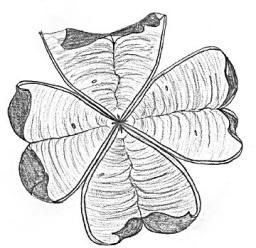
As I look back and reflect upon all of the ways I have grown this year, I cannot help but smile and laugh, offering myself grace. A beloved friend said these words to me last week – and I feel that in the present moment of my life, they ring brilliantly true: “You’re doing it! You’re living your life, wildly and deeply rooted in the Spirit.”
In the midst of so much approaching change and uncertainty, as well as so many goodbyes, I am not as scared as I thought I would be. Today I realized that I am more excited and confident than ever.
I don’t think my certainty and hope come from the new, but rather from the old, the past, the heirloom. Basking in the knowledge that I am deeply rooted, I know that regardless of how far I branch out, I will never be uprooted from all of the beings and places I call home.
My heart feels as though I am in several different places all at once, my head tells me to remain present in this moment, and my soul whispers a reminder that they all are one – God’s.
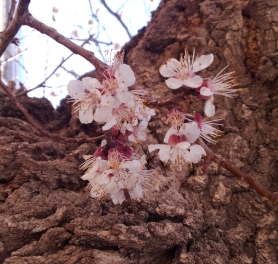
Today, I reflected on how proud I am of the ways in which I have grown this year. In my final paper for the Vocational Discernment course, I wrote a section about fertilizing. In Spanish, the word for fertilize (vb) is desbrocear. Interestingly, this word has a second translation in Spanish: to subscribe. This list of proud growth-moments includes actions that help me to fertilize my life with joy and presence. I have literally subscribed my time and energy into practicing these things and my life has yielded fruit because of it.
This year, I am proud that I have spent more time…
…dancing
…singing
…watching the sunset
…forgiving
…biking
…laying under trees, looking up
…getting to know my students and co-workers personally
…cooking
…listening to Latin music
…drawing
…making my bed
…listening
…walking
…praying
…writing letters and postcards
…thrift shopping
…meditating
…paying attention to my breath
These are simple ways that I have grown. They don’t 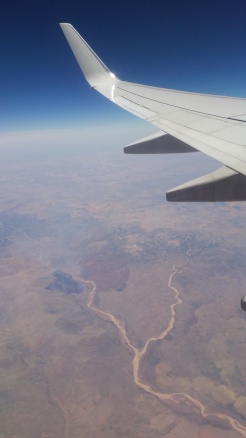 take much effort to do once, but I have intentionally listed each one, as a testament to how proud I am of the effort and diligence it has taken to practice them regularly. Doing small things with great love isn’t easy. However, these small buds of growth make me hopefully for the continued growth to come. I hope to goodness that I can keep doing a lot of these things, but even now, as the energy that sparked my writing when I started has slowly turned into tiredness as I finish typing this blog post, I recognize that I will fail to meet my expectations, and that it is okay.
take much effort to do once, but I have intentionally listed each one, as a testament to how proud I am of the effort and diligence it has taken to practice them regularly. Doing small things with great love isn’t easy. However, these small buds of growth make me hopefully for the continued growth to come. I hope to goodness that I can keep doing a lot of these things, but even now, as the energy that sparked my writing when I started has slowly turned into tiredness as I finish typing this blog post, I recognize that I will fail to meet my expectations, and that it is okay.
As I look back and reflect upon all of the ways I have grown this year, I cannot help but smile and laugh, offering myself grace in the present and in what is to come.
Learning to Fish
As a kid, I hated fishing. My neighbor caught dozen of carp each summer from the channel that runs behind our backyards. As for me, every time I tried to fish, I would start reeling in my line too early or too late, and I eventually became bored enough that I would prop my pole in the breakwall and run off to play something else. I remember being so jealous of how effortlessly Brandon caught fish. And I also remember not devoting any of my time or energies towards learning how to fish better.
My childhood experience with fishing strongly parallels my experience with vocational and spiritual discernment. I never understood and quite frankly envied friends and mentors in my life who were good at listening to God’s still small voice. And yet, in much the same way as fishing, I never took the time to ask and learn about how they listened.
—
At the beginning of my YAV year, I was asked to think about my own discernment process in the midst of important decisions in my life: decisions surrounding the mission trip to Honduras during my senior year of high school, where I went to college, whether or not to study abroad, and to apply for this YAV year. And in analyzing these decisions, I realized that my discernment processes have been really underdeveloped and minimal. Sometimes, I would make a long list of options only to ignore the guiding words of a mentor. Sometimes, I was too scared to start doing research and ended up finding the right decision on a whim. Sometimes, I would get bored of waiting and felt like giving up the discernment process all together. I have often put my figurative vocational fishing pole in the breakwall of fear and indecision.
I realized that I hadn’t developed any structure of planning or analyzing or listening in order to hear where God was calling me, but I more often than not sporadically stumbled across the answers. Thinking back to when I was a kid, I do remember coming back to my pole after having run off to play baseball or soccer. Occasionally, I did catch a fish even when I wasn’t watching.
But this wishy-washy, underdeveloped, unintentional means of discernment wasn’t going to fly this year. In this year of intentional service, I have learned to be intentional about a lot of ways that I chose to live, including how I chose to discern God’s path for me. And so this year, God is teaching me how to fish.
—
I have done a lot of preparation to hook and bait my line (and I would like to acknowledge the incredible amount of love and support from so many people that I received in this process). I went to college, earned a degree and teaching certificate, I know how to write and carry out a lesson plan, how to accommodate for individual needs of students, I have gradually improved my classroom management skills, and I am learning lots this year about student driven learning. And in the midst of all of this preparation, I found myself scared and apprehensive.
I had my resume ready, but I was worried that I wouldn’t have the right certification or a good enough test score to hook jobs that I might apply for. As I talked with my mom about all of this, she pointed out that my fear of not finding one job that perfectly fit my expectations was prohibiting me from applying to any job. She wisely and gently told me: “T, you have to cast out your line if you actually want to catch something. You’re placing way too much faith in your own ability to fish when you really need to trust that God is the best fisherman around.”
—
So, with a renewed sense of confidence and encouragement, I finally cast out multiple lines in hopes of seeing which line pulled hardest. I sought out schools who shared my passion and hope for educational equity, social justice, and social, emotional, leadership, and academic development of students. I applied to middle school and high school math and Spanish positions in 6 states and 3 countries. I interviewed with 4 schools. And throughout the whole process (which really only lasted about a month), there was one line that kept pulling me in.
I am excited to share that next year, I have accepted a position as a 7th grade math teacher at Imagine Avondale School in Phoenix, Arizona. Yes, Phoenix. (I know it’s really hot). It’s also a place where I know that God is leading me to learn – to learn how to best teach all students, how to be a collaborative and empowering co-worker, how to make intentional community wherever I go, how to better love all living things (including how to best love and nourish me), and to learn that in the midst of so many hopes and expectations, God will stretch me and teach me in ways that I can’t even begin to imagine.
—
Fishing is a process. I’m not going to master it after one try or after I catch one fish. I’m not going to be able to discern God’s call after I apply for (or accept, woohoo!) one job. It’s a life-long practice that I need to start engaging in now. There’s no more time to be scared and apprehensive.
The water that I am casting (and will continue to cast) my vocational line out into is a lot wider and deeper than I originally anticipated. There are places and people, both known and unknown, who will teach me a lot about how to lean into the uncertain, but faithful journey of life. As I cast out lines into deeper and wider water, I am eager to meet new friends and old, life-long travelers with whom I’ll grow and learn.
—
While this feels like the closure of a long season of discernment, this by no means indicates a close to my YAV year. There will be more thoughts and reflections and blog posts! And I invite you to continue reading, commenting, initiating conversations, and journeying with me as you have so far. As for when the YAV year does come to a close, I am eager to continue sharing, talking, and walking with you all in whatever form that may take. While I’m not sure what those forms may be yet, I ensure you that I am always willing to communicate, to send letters, to write emails, and to cultivate these relationships that are so important and life-giving.
Whether this is a selfish or solidaritous request, I hope and pray that I can continue to walk and learn with you all at my side for a long time. I thank you for walking with me this far, but I am even more eager to walk with you for the journey that lies ahead.
The God Equation
During my semester abroad in Costa Rica, I wrote a paper about the influence of international business on developing countries, particularly in Latin America. In the book, The Open Veins of Latin America, author Galleano uses the word todopoderoso (all-powerful) to describe business, when previously, I had never heard the word todopoderoso used to describe anything but God. Galleano goes on to write about how when the United States decides to reduce the price of a particular coffee brand by 1 cent, it can result in millions of dollars lost in the country where the coffee is produced. Small decisions can drastically influence industry of developing countries. This idea that a decrease in 1 cent can so drastically affect profits made me think of different equations in math.
The equation of a cubic function has “arms.” In the first graph (y = x3), the arms are reaching towards the upper right and the bottom left. However, by simply introducing a negative into the equation (y = -x3), the reach of the arms suddenly jumps to the upper left and bottom right (graph 2). When you change the leading coefficient, suddenly the entire range and shape of the equation are switched around.
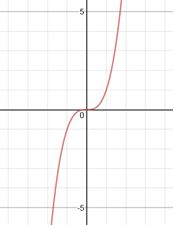
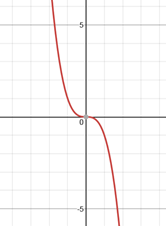
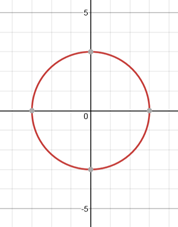
Graph of y = x3 Graph of y = -x3 Graph of a circle (x2+y2=r2)
And I wonder: does US business have control of the leading coefficient? Why do we have this control? It’s not fair that one country or system can control the rightly earned profits of another country or system. So, what would it look like if the equation were re-written?
In trying to re-imagen the equation, I considered what the equation of God would look like. I don’t want to image that God has reaching and influencing “arms.” I don’t think that God lets some people and places have abundance and in turn abandons others. I prefer to see God as a circle (graph 3); particularly one with an infinite radius. A circle doesn’t have arms that only reach in certain directions at certain times. And regardless of how you change the variables, a circle is always connected, all encompassing. A circle has an even, wide, endless spread.
The difference between the business equation and the God equation is that there is a missing variable. The equation of a circle is x2+y2= r2. The God equation has an extra variable of “y” that the equations I chose to model business don’t have. There is something (or I would argue a lot of things) that the business equation is missing and lack compared to God’s equation.
The metaphors of the business and God equations tie directly into what Jesuit Father Greg Boyle says in describing our role as followers of Christ: “We ought to be standing in the lowly place, in the margins, as Jesus did, so that the margins will get erased. We ought to stand at the very edges of the circle of compassion so that the circle will widen because we’ve chosen to stand there.”
When I first arrived in community (and it still happens now), I struggled with putting the needs of the community above my own. I struggle with staying up later than my usual bedtime so that I can talk with my roommates when they get home from work. I struggle with doing the dishes when it’s supposed to be someone else’s day to do them. I struggle with putting other’s needs above my own, even in a small, like-minded intentional community. I struggle with giving up the idea that I really don’t have control of my own equation. That my own equation, my own independent way of doing life, really doesn’t exist. And that the equation I need to be worried about if I truly want to best support the growth and livelihood of myself and my community is the circular God equation.
My hope and prayer is that we can stand at the edges of the circle of compassion, stand with the marginalized people of this world, to show what solidarity and companionship and love can look like. And maybe through our example, in our small communities, and in the larger world community, we can start to widen the circle until there is an infinite radius.
It is incredibly challenging, important, and life-giving work: giving up our own equations and instead joining the fight for the God equation. But it’s the only work that makes any sense to me. I hope you’ll join me in falteringly and humbly following God’s lead in figuring out how to widen the circle.
Vamos Dibujando el Camino
In February, I began a graduate course in Vocational Discernment with McCormick Seminary. Each week, myself and the other students and teaching assistants read several articles and excerpts from social justice heroes and sheroes talking about the importance of, challenges that come with, and joy of being in community. Additionally, the instructors offer practices and resources that help us to be present and engaged in our current spiritual journeys. One of the practices is a spiritual practice called praying in color.
Praying in color is a practice of prayer. There are no rules or regulations other than you have to draw and use colors. (You can view some examples online here).
For me, it’s a really simple, but really powerful means of prayer. It lets me be creative and express both my joys and my sorrows. It lets me pray in a way which doesn’t necessarily need words. It lets me pour out deeply rooted happinesses and concerns onto paper and reflect upon them. With the few times that I have practiced praying in color, each time I realize something within myself that I didn’t know was there before.
Moreover, drawing has become an important spiritual practice for me. I don’t consider myself to be an artist; however, one of the best ways for me to engage in emotionally and intellectually stimulating classes in college was to take notes in the form of doodles, so I figured I would give it a try without the lecture part this time. Here is the prayer that I drew:
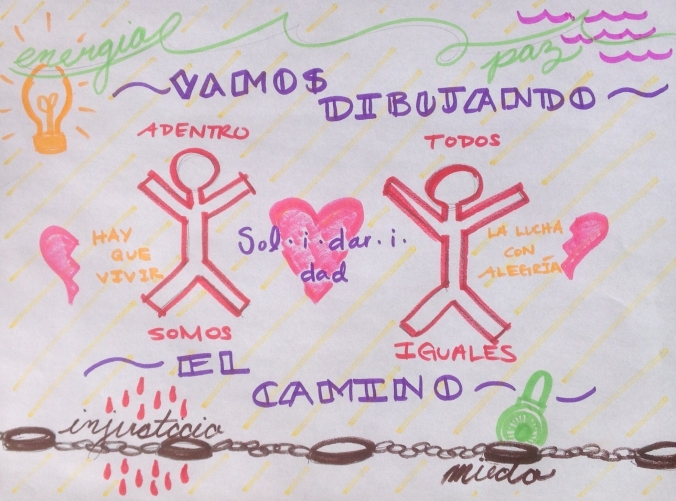
While my stick figures and stripes are not all that impressive, I was struck by the duality I came to draw in my prayer. Starting out, I thought I was drawing a corporate prayer, a prayer that I have for others and for the world. I drew contrasting pulls of energy and peace versus injustice and fear. I drew broken hearts and healed, whole hearts. I wrote down phrases from some of my favorite social justice advocates, mentors, and friends as pieces of hope and inspiration for working towards reconciliation.
And as I look at my drawing, I am struck at how this prayer is as much for myself as for the world. This is a prayer of what I hope God keeps ever-present and visible in my life: dissonance, hope, and energy for the journey. Vamos dibujando el camino, sings Calle 13 – We keep walking, drawing the path as we go.
Mountain Climbing
Two Sundays ago, the ABQ YAVs eagerly attended service at Second Presbyterian Church, where we spoke on the theme of the transfiguration from Matthew 17:1-9. Below is the transfiguration story from Matthew as well as a reflection that I wrote about the transformations we are seeing during our years here in New Mexico. Please also read the blogs of the other ABQ YAVs (links are shown at the end of the blog) to read there incredible and inspiring reflections about their personal transformations.
The Transfiguration
And after six days Jesus took with him Peter and James, and John his brother, and led them up a high mountain by themselves. And he was transfigured before them, and his face shone like the sun, and his clothes became white as light. And behold, there appeared to them Moses and Elijah, talking with him. And Peter said to Jesus, “Lord, it is good that we are here. If you wish, I will make three tents here, one for you and one for Moses and one for Elijah.” He was still speaking when, behold, a bright cloud overshadowed them, and a voice from the cloud said, “This is my beloved Son, with whom I am well pleased; listen to him.” When the disciples heard this, they fell on their faces and were terrified. But Jesus came and touched them, saying, “Rise, and have no fear.” And when they lifted up their eyes, they saw no one but Jesus only. And as they were coming down the mountain, Jesus commanded them, “Tell no one the vision, until the Son of Man is raised from the dead.”
The transfiguration scripture starts with Jesus leading Peter, James, and John up a high mountain. Throughout the Bible, mountaintops are places that are seen as “closer to God.” And Jesus often leads people up mountains in order to reveal a fuller and clearer vision of who God is to his disciples.
As each of us arrived in New Mexico, we were, in a sense, already beginning our mountain climbs. Literally, Albuquerque is at a much higher elevation than Oregon, Texas, Wisconsin, Ohio, and Virginia – the states we have come from. And although the mountains here are beautiful, they are breathtaking in more than one way… the altitude definitely takes some getting used to. Just our physical journeys to the mountaintops of New Mexico required that we make some adjustments.
However, perhaps even more significant have been the metaphorical mountains we have been climbing. In each of our respective work placements, at home in our intentional community, and in the new culture of New Mexico, we have all been seeing from new vantage points and with new lenses. Climbing literal and figurative mountains has given us new perspectives.
In this particular story, while Peter, James, and John were climbing up the mountain, I’m not sure if they were aware of just how dramatically their worlds were going to be turned upside down. They had answered when Christ called them to follow him. And I suspect that these three disciples knew Jesus was pretty special, for they had been loyal and stuck around ever since. However, even though they had heard rumors that Jesus was the Messiah, it took this mountaintop experience for them to really get the point. Seeing Jesus, transformed before their very eyes, wearing clothes that were an almost blinding white, I think they finally understood that Jesus was more than just a man, that he was truly the Son of God.
Leading up to our time as Young Adult Volunteers, I think we knew that we were embarking on something special, but we didn’t quite fully gasp (and probably still don’t) the magnitude of what we are learning this year. And as we engage with a wide variety of people in our work, in our intentional community, and in the greater community of New Mexico, I think the same type of transformation is occurring within our hearts. While we knew that God was good and that all people are God’s beloved children, this year has reinforced and renewed our hope in God’s promises and in God’s people.
I now invite you to read the stories of my fellow YAVs as they share some of these stories of transformation: stories about gaining new perspectives, stories about mountaintop experiences, stories about how our journeys thus far have given us clarity. I invite you to listen for how this newfound clarity has allowed us to value and love all of God’s people more than we did before.
Read Audrey’s reflection here.
Read Bethany’s reflection here.
Read Claire’s reflection here.
Read Ana’s reflection here.
Growing Pains and Conscious Dependence
These four months of living as a Young Adult Volunteer have initiated incredible learning and growing, for sure; however, they haven’t come without necessary growing pains.
—
I am an individual of great privilege. I am who I am today because of the opportunities, supportive communities, life-long mentors and friends, and love that I have been given. I can never adequately show my gratitude for the strength, love, and confidence you all have instilled in me. Yet, I also can’t ignore that not everyone is born into such a place of love, support, and privilege.
This is not to say that I am not privileged in my current living situation either. I have a fulfilling job with supportive co-workers and wonderful students. I live in a beautiful house surrounded by strong, courageous, and engaged sister volunteers. And although we live on a budget smaller than that I have lived on before, we eat, experience life, and live very well and comfortably.
So why the growing pains? To be honest, it’s the little things that I knew I was signing up for – the things that I intentionally chose the YAV program in order to experience – that have frustrated me the most and made me most aware of my privilege and of my dependence.
—
Over the past three summers, I have written my own curriculum and taught in my own classroom. During student teaching, I had full independence and control to teach what I wanted to and how I wanted to. Here in Albuquerque, I am working as a part-time volunteer teaching assistant. It has been hard for this perfectionist, used-to-having-control, engaged first-year teacher (that would be me) to go from teaching in my own classroom to assisting in seven different classrooms. Sometimes I feel like I am not doing enough. Sometimes I feel like things are not going how I would like them to. Sometimes I want to do more.
And yet, being a teaching assistant has given me the opportunity to grow in ways that I wouldn’t if I were teaching in my own classroom. Not having to focus on lesson planning, copying papers, and always being the one to give instruction has allowed me to solely focus my energy on the students’ academic and personal needs. I am learning so much about individual student interests, struggles, and learning needs. I have more time to sit and listen to students who need someone to talk to. I have more time to go to sporting events and support students outside of school. I can work more closely with students who need one-on-one attention. I get frustrated and discouraged sometimes; however, more often than not, I am encouraged and motivated and impressed and inspired by my time with the students here. Taking a step back has been an incredibly humbling learning and growing experience.
—
The other main source of growing pains has been not having a car. Since I was able to drive, I have never been without a family car or a personal car to drive. I am fortunate enough to have a bike to ride and the Albuquerque bus system is very affordable, but yet I still get frustrated way too frequently and easily and I often feel stuck. I had never used the public bus system before studying abroad in Costa Rica and I can still count on my two hands the number of times when I have used public transportation in the United States. Growing up, driving a car felt extremely normal and something that was a given. I am reminded frequently here that a car is a huge privilege. And the fact that I have never been without a car until now is an even bigger privilege.
Being without a car makes me very dependent on the other YAVs here in New Mexico that do have cars. Although I can bike and ride the bus to a lot of places, there are just as many places that the public transit system does not travel to. And being used to lending out my car and being the designated chauffer for my friends in high school and college, it has been frustrating to have the situation flipped around here. I feel like a burden to other people if I want to do anything off campus. I feel dependent and needy.
And yet, in the frustration, I recognize that feeling dependent reminds me of my shared humanity – reminds me of how dependent I really am on my friends, family, and parents. Even when at times I feel independent and strive for more independence, I can never and should never forget that I am interdependent on so many people. Even if it takes something as trivial as not having a car to drive, I am glad (although often reluctantly) for the reminder that I cannot – truly cannot – do everything on my own. I depend on other people and other people depend on me, and that is a necessary and good and solidaria thing.
—
Coming from a place of privilege, it is hard to look that privilege in the face and put my reflections into practical action. It’s not an easy nor a quick process. Sometimes, I feel so guilty that I want to stop trying. Sometimes I feel like I am never going to kick the privileged way in which I think or act, so I wonder if it’s even worth trying. And sometimes, I savor and appreciate and feel so blessed to be learning from the times of discomfort and clarity.
There are many moments when I recognize how dependent I am; and in these moments, I become frustrated. But these moments also help me recognize how dependent I am on God. Living in conscious dependence of other people and of God doesn’t mesh well with the independent way that I am told I need to live as a young adult. Ultimately, it is in this conscious dependence of my neighbors and of God that I recognize how blessed, lucky, and privileged I am to be doing exactly what I am doing right now.
These are little, seemingly non-consequential, non-important things that have been my biggest struggles so far. And yet, I think sometimes, when I don’t take time to recognize, make peace with, and reconcile these little things, I miss the bigger things that God is trying to show me.
—
The growing pains that I am experiencing through recognizing and examining my privilege are painful by nature. With hesitancy and excitement, I welcome these pains and offer myself and others grace in the process, realizing the growth that they bring.
The Slow and Difficult Work of Healing
Pslam 51:17 – The sacrifice acceptable to God is a broken spirit; a broken and willing spirit, O God, you will not despise.
The first four months of my YAV year have provided time to retrace, reflect, unearth, and ponder. Time in a new place has forced me to think back to experiences that have been deeply formative in my life, to re-live them in a sense, and to reflect on how they are still forming my life and my future now.
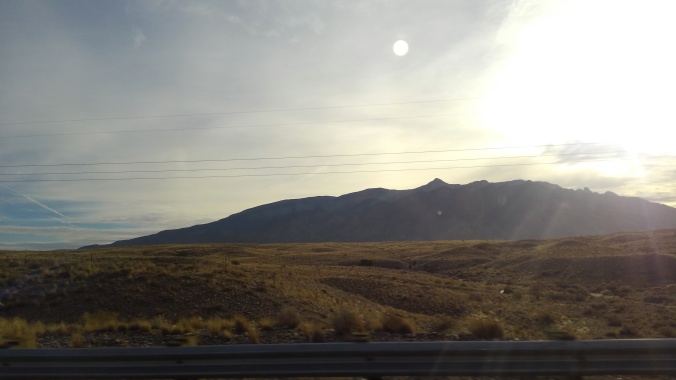
In this process of introspection and meditation, many of those deeply formative moments that have continued to show up and be present on my mind have been experiences towards which I continue to feel a gnawing pain and hurt. Some of the wounds that I have ignored and that have scarred over have peeked their way out of the shadows and are saying hello again.
So, as I went back home and thought about what to say to my family and to my church, I felt a nudge to speak a harsh, but necessary truth. A truth that we are all wounded and broken people. A truth that I have discovered about healing. And I’d like to share my thoughts with you, too. As you read my reflections, I ask that you open yourself to what God might be unearthing and placing in your heart and your mind.
Breathe in. (Let God in). Breathe out. (Release your expectations and control).
As I talk about a particular feelings today, I invite you to take the time and space to transport back to a moment when you had this same feelings. And let that memory or that space sit next to you. Don’t let the feelings overwhelm or consume you, but recognize that there is space for this feelings here and invite God in so God can start healing. Listen to what these feelings have to say.
The feeling I’m talking about is the feeling you experience when you recognize that something is unexpectedly, but powerfully broken. The feeling when there is a lump in the back of your throat, and you’re holding down a scream, but instead of screaming, all you can do it let your anger, frustration, and devastation out through tears. And perhaps all you can do is weep, uncontrollably, and you can’t will yourself to stop.
Take a few moments now to remember a time when you had this feeling too… and invite God in.
Breathe in. Breathe out.
When I re-live this feeling, I think about the church. Church has been a place of both deep joy and deep pain in my life. My experience with the church has taught me more than perhaps any other position or job I’ve had. But it also left a scar. And it continues to surprise me how when I try to explain how the church has both fortified and wounded me, how I more often than not end my explanation in tears.
We all have been wounded, whether by the church, or by people we love, or by society, or by our own failures – or most likely, by all of the above. Some of those wounds may have scarred over, and some may still be bleeding. Nonetheless, if we want to heal our physical, emotional, spiritual scares, we can’t cover them up and ignore them.
The psalmist reminds us of this – there is no sacrifice or offering we could ever make that will please God. All God wants us to bring is a broken and willing spirit. And this realization feels freeing to me because often, a broken and willing spirit sounds like the only thing I have that’s worth offering. God reminds us, we don’t have to be perfect, we just have to be our vulnerable, hot-mess, needy selves.
Therefore, we can’t keep hoping and waiting for a cure – because there isn’t one. And so we have to uncover our wounds, clean them up, and start the slow and difficult work of healing as we put on a clean bandage.
Author Rachel Held Evans speaks to the distinction between curing and healing much better than I can. Although it took me almost a whole year to finish her book (Searching for Sunday… I highly recommend it), it has helped me to arrive in a place where I know I am broken and flawed, I can own and accept it, and I can begin to work towards healing my own wounds and those I have inflicted on others.
Rachel says:
“But there is a difference between curing and healing, and I believe the church is called to the slow and difficult work of healing. We are called to enter into one another’s pain, anoint it as holy, and stick around no matter the outcome.
The thing about healing, as opposed to curing, it that it is relational. It takes time. It is inefficient, like a meandering river. Rarely does healing follow a straight or well-lit path. Rarely does it conform to our expectations or resolve in a timely manner. Walking with someone though grief, or through the process of reconciliation, requires patience, presence, and a willingness to wander, to take the scenic route.
As Brené Brown puts it, “I went to church thinking it would be like an epidural, that it would take the pain away… But church isn’t like an epidural; it’s like a midwife… I thought faith would say ‘I’ll take away the pain and discomfort’, but what faith ended up saying was ‘I’ll sit with you in it’”.
God sits with us in it. We need to be there to sit with each other in it.
Breathe in. Breathe out.
Look back into experiences that you have pushed into the shadows. Identify places that need healing. Go through the process of imagining what it would like to undress the wound, clean it, and re-bandage it – ready to not hide it anymore. Ready to recognize that we all come to church, work, and life bearing wounds. Ready to invite God to sit with us in these places. Not one of us is unscathed. We are broken people and we need to be vulnerable enough to share in deep pain with one another, because we can’t heal on our own.
As we go into a new year and revisit experiences that have formed us – experiences of brokenness and of joy – my prayer is that we would be vulnerable, true, broken, and willing.
I pray that we would find communities that would be for us perhaps what the church looks like at its best: a safe place where a bunch of struggling, imperfect people can sit together and speak difficult truths to one another in love.
May it be so.
Thankful for Community
Intentional community is one of the core tenants of the YAV program. During the first week of orientation, we were given this description for what it might look like and what it might mean to live intentionally with the other YAVs at our sites:
YAVs explore what it means to be a Christian community with one another and their neighbors. While some will live in housing together and others spread throughout their country, all YAVs will reflect together on their service and explore their relationship with God, the church, and their ministry in a broken world.
On November 3rd, we started our week-long border delegation to Tucson, Arizona and Agua Prieta, México to learn about the realities of broken and oppressive systems in the shadow of the physical border than exists between the United States and Mexico.
On the first night of the trip, the ABQ YAVs stayed at an intentional community called Sitting Tree in Tucson, Arizona. Co-founded by Rick Ufford-Chase, one of the orientation leaders that led our bible studies at Stony Point in August, Sitting Tree is an intentional community made up of a diverse population of families that have committed to living, struggling, and sharing together. While each family has their own living space or apartment, the community as a whole shares a meal each week and meets twice a month to coordinate issues that come up regarding common spaces, budgeting, etc… as they live in such close proximity.
I continue to be amazed at the incredible love, awareness, and sense of solidarity that I felt during our one night stay with these families. Below is a reflection that I wrote surrounding these feelings while the families were getting ready to share a meal together:
Sitting at the picnic table that overlooks the common yard at Sitting Tree, I feel like this place is the intersection of so many places I’ve been and of so many people I’ve met.
Maybe it’s not where I’m supposed to be next or what I’m supposed to do next, but who I’m supposed to meet and love and learn from next. That makes the most sense of anything to me.
Strung up lights, reverse osmosis water, line-dried clothes, the smell of community dinner on the stove. It’s humble, but enough. It’s a little chaotic, but restful and at peace.
I sit in this place and I jump back and forth in my mind to the conversations and places and people who have ultimately led me here – right here.
I think about organic hospitality and the conversations I had with Chuck Bailey and Craig Cera at Wednesday night bible study. Pienso en Don Juan y nuestras conversaciones sobre las maneras que vemos a Dios y el temor que la gente tiene para el uno del otro. I think about cul-de-sacs and the ways in which Rick Ufford-Chase challenged my perspectives. Pienso en Doña Marta y el descubrimiento del tigre del hambre y de la humildad. I think about the sense of strength and resilience and joy that I felt during the “Thanksgiving dinner” that I ate with my family in August before I left for this year of transformation.
I don’t know much about this space or much about the people who live here, but I know that it is a sacred space. And that God is very close here.
I thank God for the intentional community that I have here in Albuquerque, New Mexico this year. For a community with whom I can sit and grieve and figure out my privilege and my complacency and my hopes for this world. To quote Tucson YAV Leah Bishop, “It is so life-giving to be surrounded by people who are willing to and want to challenge white supremacy and all the related systems.”
I hope and pray that I will seek out people, instead of places or jobs, who I can learn and love and grow from next.
Law and Order
On November 3rd, we started our week-long border delegation to Tucson, Arizona and Agua Prieta, México to learn about the realities of broken and oppressive systems in the shadow of the physical border than exists between the United States and Mexico. While in Tucson, we attended the proceedings of Operation Streamline, a joint initiative of the Department of Homeland Security and the Department of Justice. Started in 2005, this initiative uses a “zero tolerance” approach in order to fast track the sentencing (and deportation) of exclusively Central American immigrants who have crossed the border without documentation.
In order to better understand the intent and happenings of Operation Streamline, I urge you to read this blog written by Bryan Schatz that clearly explains the purpose and execution of these court proceedings. You can find the blog here: http://www.motherjones.com/politics/2017/07/a-day-in-the-assembly-line-court-that-sentences-46-border-crossers-in-2-hours/
On November 7, 2017, YAVs from Tucson, Austin, and Albuquerque witnessed the proceedings of Operation Streamline in Tucson. During the 2 hour court proceeding, over 70 men and women received sentences and orders for deportation back to their home countries of México, El Salvador, Guatemala, and Honduras. I hope that Bryan’s words provide context and explanation to explain a poem, of sorts, that I have written concerning my observation of Operation Streamline:
Names, flashing on a flat screen television,
like a flight schedule at the airport.
You have to give undivided attention just to read a few names.
People’s livelihoods, turned into a schedule of 30 minute appointments.
And next to the screen, a wall of primarily white men,
smiling, as if to enter you into the courtroom.
A wall of expensive tile surrounds the country’s crest;
underneath it sits an old, glasses-wearing, white man.
The ceiling – turquoise, purple, and red –
reminds me of an Escher design,
conveying a strong energy.
But not the right kind.
Ten men enter.
Their names are said to recognize their presence,
and yet, when the judge forgets a name, it feels like an inconvenience.
Their names may be recognized, but not their humanity.
The judge reads their rights, a long list of hurdles.
None of which wait before a finish line.
There isn’t an option to even finish the race,
yet each man and woman was born already running.
“Do you want to give up your rights so you can plead guilty, knowing the maximum sentence is six months?”
“Sí. Culpable.”
“Are you a foreign citizen and did you enter the United States illegally on November 3, 2017 in Nogales, Arizona?”
“Sí. Culpable.”
And when they say no, they are assumed to be confused.
Heaven forbid they don’t speak from the script.
The question is asked again,
And the answer changes.
“The Government is satisfied.”
A man admits he has received death threats from his home country,
and all the judge wants to know is if this information affects his guilt.
No one seems to care for his well-being;
perhaps because he is seen as a liability and not as a person.
“Did I pronounce that okay?,”
asks the judge when he has already read all of the names.
“That was great,”
replies a public defender.
He laughs, “I try.”
Is he trying for comedic relief?
Because he seems to be the only one who isn’t uncomfortable.
And the air feels even more suffocating to me.
Nickels and Dimes:
the rules change when you enter for a second time.
The sentence, the fine, the humiliation grow exponentially,
with an additional $10, $50, $100 fine tacked on.
Months to years, thousands to tens of thousands, civil to criminal…
although being treated like a criminal hasn’t changed.
This is a business, todopoderoso.
It’s too clean, too organized, too easy;
and yet this is not the reality.
It’s incredibly messy, ridiculously unorganized, and critically difficult.
Oh, how blind the system makes us.
This is not a toothache, with prescribed medication and a quick fix.
This is a cancer,
spreading ruthlessly with no effective painkiller
And without foreseeable cure.
“Good luck to you all.”
“I hope you have no more troubles.”
But it’s not understood.
The only part of the proceedings that’s not translated
is the only part that holds any sort of empathy or compassion.
Is it resistance that the translator doesn’t translate?
Or is it courtesy that the judge pretends to care?
The government is trying to make its business look humane.
“I have two beautiful babies and a mother to support.”
“Can you lessen my sentence so I can go back and support them?”
The judge replies, “My hands are tied.”
My hands are tied by your plea agreement.
My hands are tied because of my allegiance to the system.
My hands are tied because of racism, ignorance, and privilege.
180 days.
“You came back here without the permission of the United States government.”
“You have a right to speak with your lawyer.”
But not behind closed doors, and not in a separate room, not in confidentiality.
On a bench in the same courtroom.
At best a second chance, probably a mere prolongation.
Nonetheless, life, livelihood, pride, humanity,
hung out to dry without even the consideration of privacy.
“Has anyone made you any promises other than those stated in your plea agreement?”
And what promises are those? Promises of deportation?
A promise is something that isn’t broken.
And I guess it’s true, the judge upholds the unlawful laws.
But a promise was always something hopeful to me.
Oh how wrong is my understanding;
or rather, how blind.
Why is no one crying?
Why is no one speaking out?
Why doesn’t anyone oppose?
God is crying.
God is screaming out.
God opposes.
But God can’t be present in the courtroom today.
God’s voice is muffled by law and order.